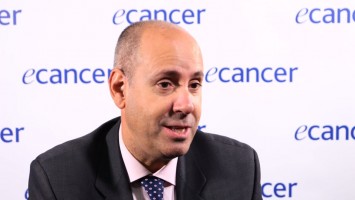SOLTI VALENTINE is a neoadjuvant study testing HER3-DXd, an antibody-drug conjugate directed against HER3 and with a payload of DXd, in patients with high-risk HR positive/HER2 negative early breast cancer. The objective of SOLTI VALENTINE, which builds on previous results from another trial, from SOLTI TOT-HER3, is to assess the efficacy of this potent anti-HER3 ADC in patients with high-risk disease which are a population of patients in need of better treatment strategies.
What was the study design?
This is a randomised phase II study with three arms: one arm with HER3-DXd as single agent, another arm of HER3-DXd in combination with letrozole, and a third arm with standard multiagent chemotherapy based in anthracyclines and taxanes. Patients had tumour collected at baseline, at cycle 2 day 1, and at surgery. The primary endpoint of the trial was the pCR rate in each of the arms. We also looked at several efficacy endpoints like overall response rate; we will also look at invasive disease free survival, also safety endpoints and translational endpoints like reduction in Ki67, change in the PAM50 subtype and change in the risk of recurrence score by PAM50.
What were the key results?
In SOLTI VALENTINE we observed a pCR rate and an overall response rate with HER3-DXd, either alone or in combination with letrozole, that was similar to patients treated with multiagent chemotherapy. Additionally, it was also very interesting to see that the proportion of patients having grade 3 or higher adverse events with HER3-DXd was substantially lower than the proportion of patients receiving multiagent chemotherapy. There were also less treatment discontinuations and dose reductions in those patients treated with HER3-DXd. The pCR rate was low overall but it reflects the biology of the tumours enrolled in VALENTINE and it was very similar with multiagent chemotherapy.
The other interesting part of SOLTI VALENTINE is the translational research that we have already presented and is currently also work in progress. But we have observed a very nice reduction in Ki67, translating to a good anti-proliferative response of HER3-DXd, both alone or in combination with letrozole. We also saw a change in PAM50 subtype from a more proliferative luminal B to less proliferative luminal A and normal-like subtypes at surgery, and also a decrease in the risk of recurrence scores and a correlation of the cell kill score, which is a composite score of the TIL infiltration and cellular composition in cycle 2 day 1 with overall response rates in the three patients treated with HER3-DXd. This confirms prior results obtained from the TOT-HER3 trial with just one dose of HER3-DXd.
What is the clinical significance of these results?
SOLTI VALENTINE suggests that HER3-DXd may be a treatment option for patients with high-risk HR positive/HER2 negative early breast cancer. I believe that these results support the continuation of the development of the drug in this context, perhaps as a part of a neoadjuvant regimen that has at least the same activity but is better tolerated for this high risk population.








